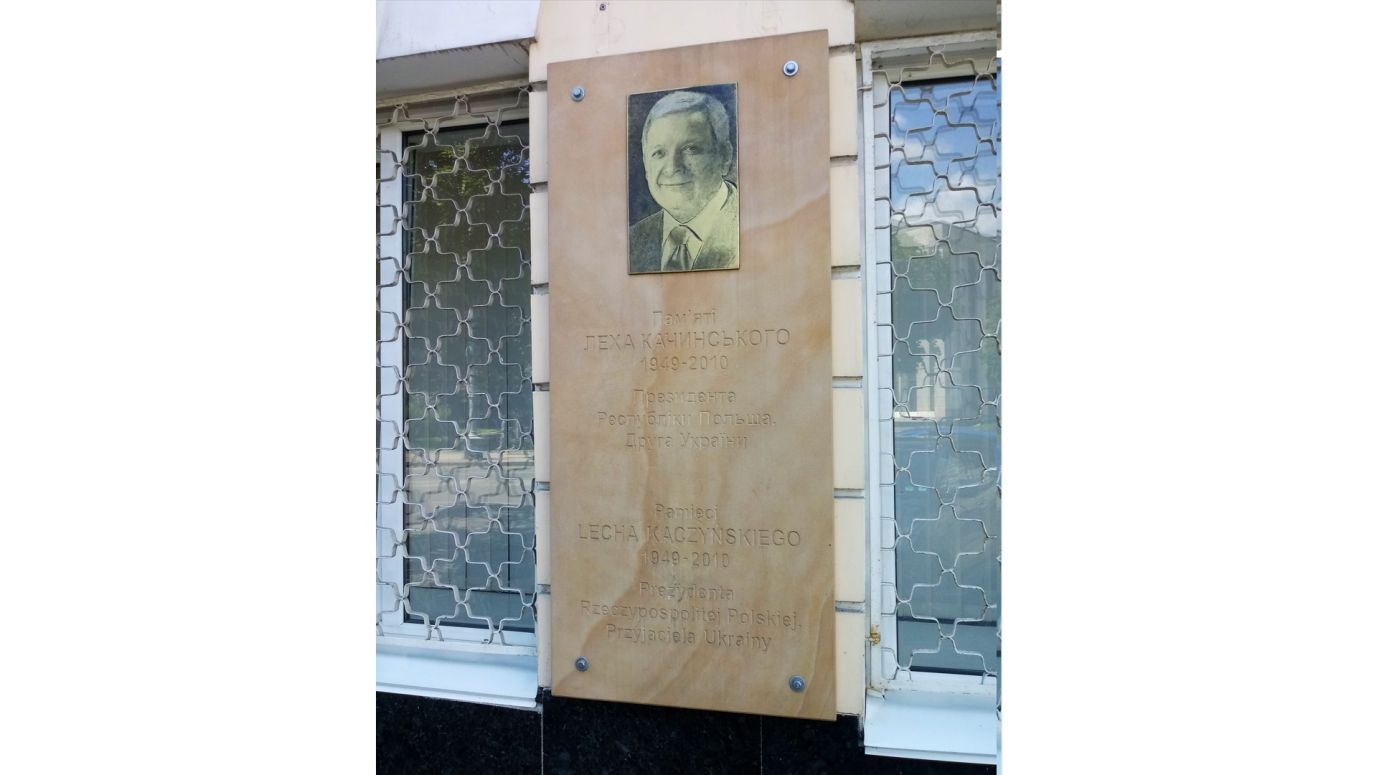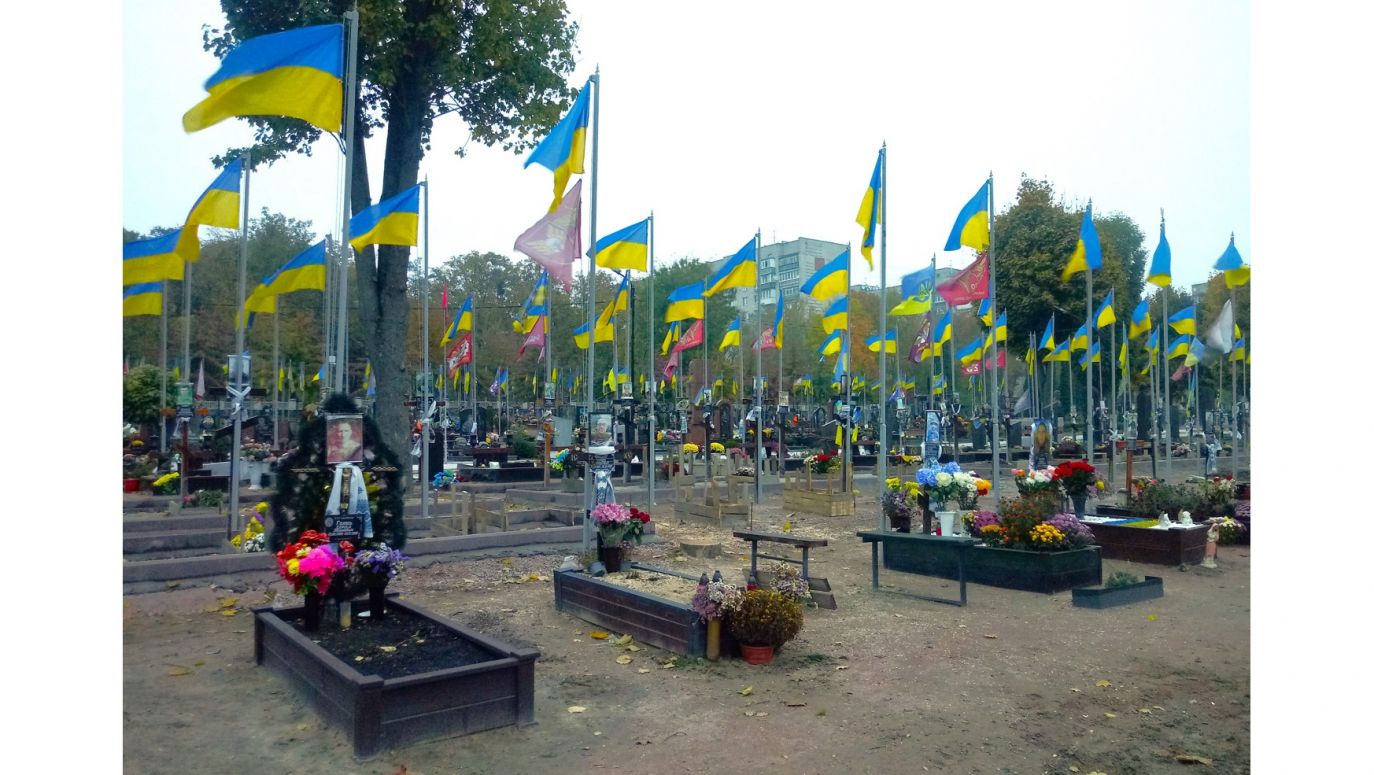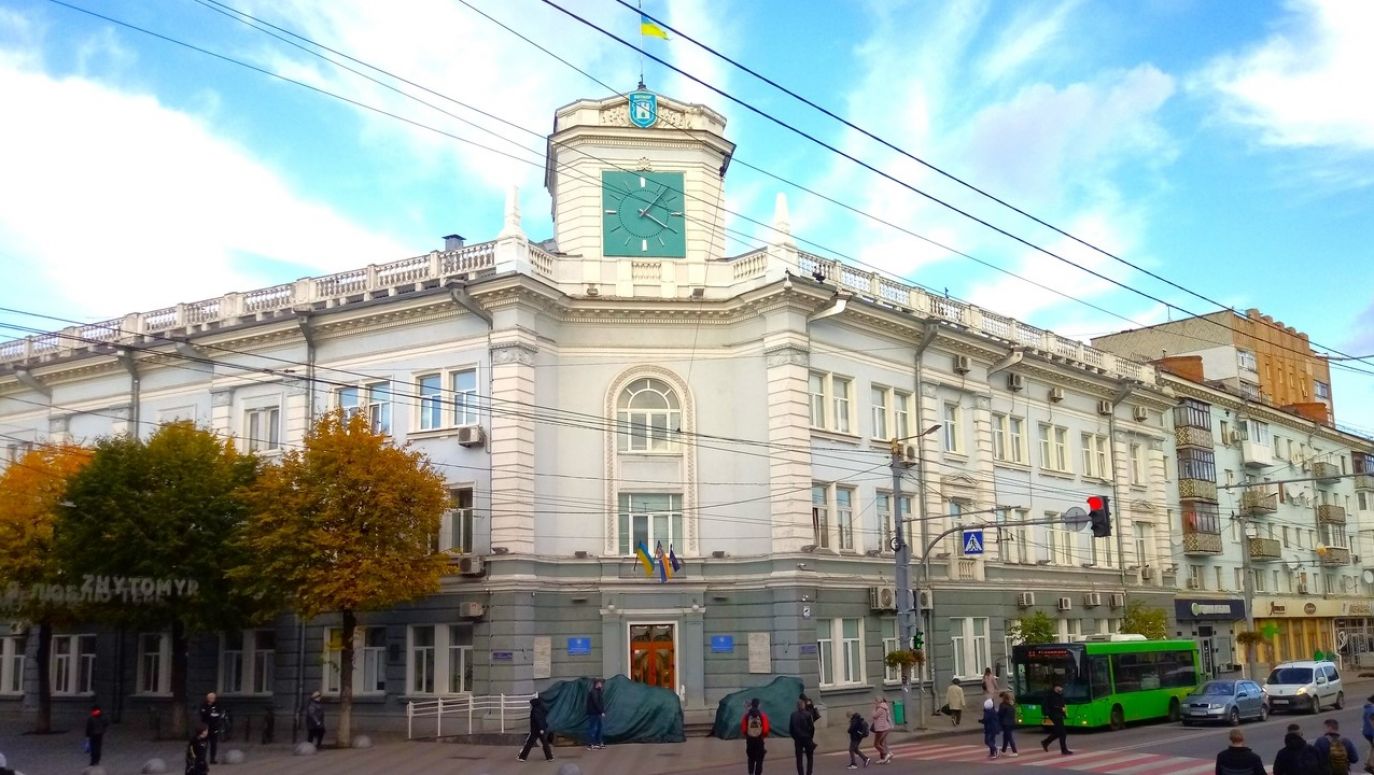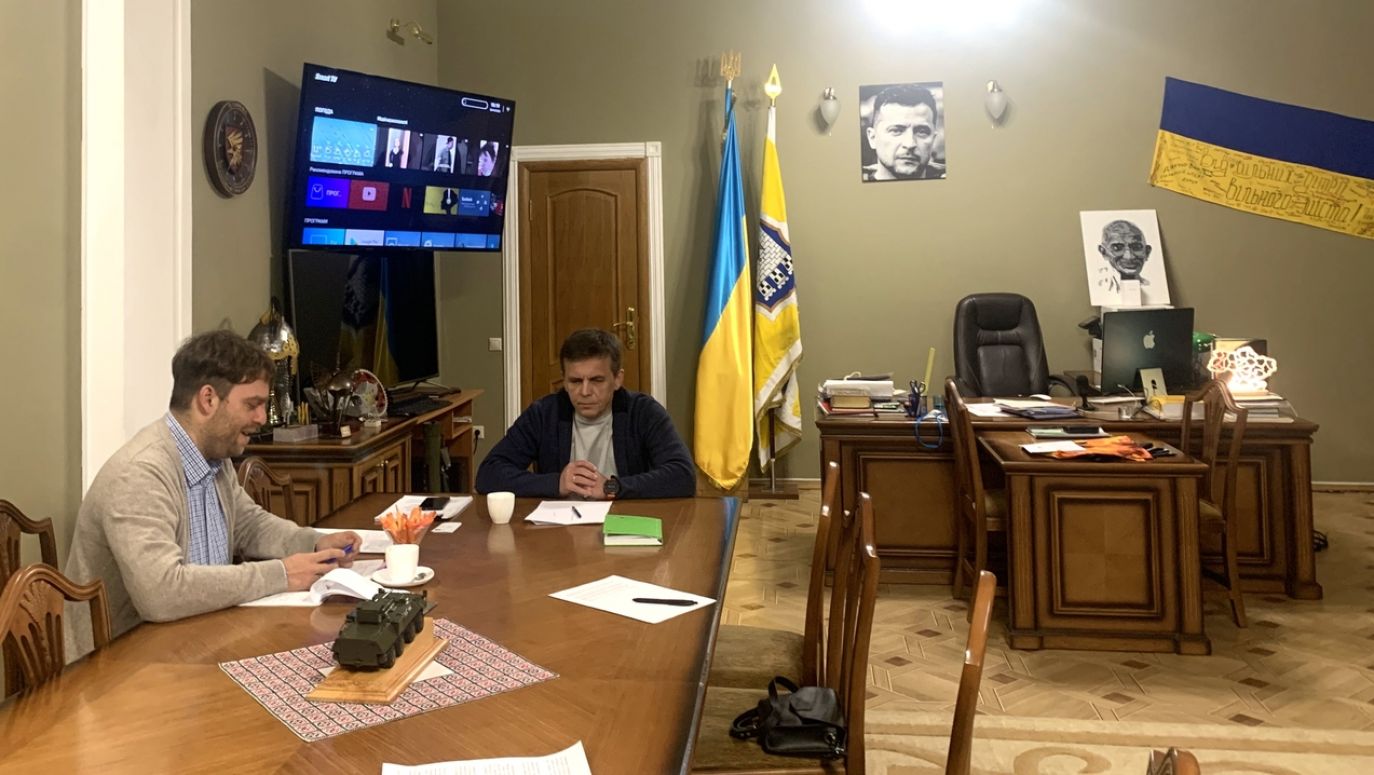Mayor of Zhytomyr: Refugees having seen different reality in Poland will bring it to Ukraine
22.11.2023
What percentage of Ukrainians knew what Poland was in 2002? A very small one. And in the last 20 years Poland has made a huge development leap. Recently, more than 5 million Ukrainians have come to Poland, where they have seen and experienced a different reality. I hope they will return to Ukraine and what they bring with them – the memory of Polish kindness, of what Poland did for them during the war – will also have an impact on our politicians – says Serhii Ivanovych Sukhomlyn, Mayor of Zhytomyr.
So the arrival of refugees from the east fills the gap left by the departure of some people?
Yes, I hope that although Poland is creating very good conditions for Ukrainian refugees, they will return to the city.
Sure, I understand this position perfectly. Ukraine will have to get its workers back. For example, for business purposes. Speaking of which, what is the state of Zhytomyr companies? Is business following the wave of refugees from the east?
In practice it is not. The first wave of company relocations which took place in the spring of last year, was a considerable one: thousands of small and medium-sized companies were relocated. They installed their production mainly in western Ukraine, in the oblasts of Ivano-Frankivsk, Lviv and Zakarpattia. Literally 5-6 companies moved to Zhytomyr, and most of them are small. But for Zhytomyr’s business, many of whose men joined the army, the refugees are a life-giving force. During the war, in March this year, we opened a waste treatment plant that had been under construction for two years. The construction of a large Italian factory, “Ferplast”, has also been completed, we just need to finish the equipment. It’s a world-famous company. So the business is developing despite unfavourable conditions, and the internal refugees are creating an opportunity, because – I shall stress this once again –the economic activity is by and large moving westwards.
Yes, that would be in line with what you said at the beginning, that for many Zhytomyr was just a stopover on their way west. It’s hard to move your business for 2-3 days…
I’ll tell you what: advanced units of the Russian army invaded the Zhytomyr region as far as 30 kilometres from the city (during the attempt to capture Kyiv at the onset of the war), so it wasn’t safe here either.
À propos security: is Zhytomyr prepared for possible acts of shelling against critical infrastructure, such as those that we remember from last autumn?
During the last heating season i.e. in winter, we managed quite well. I consider our situation to have been one of the best in Ukraine, since in most Ukrainian cities, inter alia in Lviv, Khmelnytsky, Vinnytsia and Kyiv – few-hour blackouts were registered every day. We had virtually no such breakdowns. Why was that? Not because we got a higher energetic limit. We got the same limit as in other cities. But we were well prepared – we had been working for 5-6 years before the war broke out.
Speaking of the company that supplies heat to Zhytomyr (a public utility company), we didn’t know until the last heating season that Russia could hit boiler houses, large boiler houses. We have 34 of them and we have made connections between them: if one is out of order, we are able to make up for it thanks to the others. That is the first thing.
Secondly, during this period we have built 4 wood-fired boiler houses. They work at full steam, heated by waste wood, and if it’s not enough at peak times, we add gas. In 2014 Zhytomyr used 95 million cubic metres of gas, and in the last heating season we used only 47 million cubic metres of gas. In fact, we have boiler houses in every district – if there are problems with the gas supply, if the enemy attacks the gas networks with great force, then of course we won’t be able to provide a comfortable temperature, but thanks to these boiler houses we won’t let the heating system collapse.
Thirdly, we have power generators. Since January 1, about 40% of the “Vodokonal” and “Teplokomunenerho” facilities have been equipped with generators ranging from 100 kW to 1,6 MW.
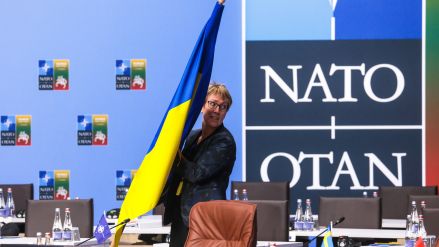
How to secure Kyiv without guaranteeing it anything.
see more
And fourthly, every day during the heating season, the company supplying electricity made us aware of the limits of our possibilities. For example, at 4 p.m., when the peak begins, the city lacks 12 MW of electricity. We understood that if we did nothing, the entire city would simply cease to function. We turned off more than half of the boiler houses, thus saving 6-8 MW, and we heated the rooms in a different way during the day. We removed about 20-30 trolleybuses from the routes, thus freeing up a few more megawatts, and we turned off, for example, the station of the first intake of the “Vodokanal”, which pumps water into the reservoirs, because we understood that there would be water for 8 hours anyway. So people didn’t feel it, and we released 12 MW, got through it, and didn’t shut down the city. Then, at night, everything was turned back on, the city was fully heated, water was poured into the tanks, and when the morning rush came, we turned everything off in the same way. This allowed us to survive with virtually no downtime. This year, our situation has improved even more because we are installing two more wood-fired boiler rooms. Additionally, we purchased three modular boiler rooms in case there was an attack in some area. We will be able to connect such a boiler room and provide people with heat during the day.
Are we talking about mobile boiler rooms?
Yes. We have purchased three such boiler rooms, two wood-fired and one gas-fired. In this way, we will be able to cover the needs of a large hospital or a small district. This year, 100% of the “Teplokomunenerho” and “Vodokanal” facilities were equipped with generators. It was 40%, now it is 100%. These are 84 high-power generators. Additionally, thanks to USAID (United States Agency for International Development), we have already received two gas piston generators, which will additionally provide us with the possibility of obtaining another 1.6 MW of electricity. Moreover, we are implementing a project to build photovoltaic power plants on the grounds of “Vodokanal” facilities, which house pumping stations and treatment plants with a total capacity of 2.7 MW of electricity. In winter, of course, they will produce less, but in summer we will get 2.7 MW.
This is a bit of a mystery to me, can the energy from these solar panels be stored in the summer to be used in the winter?
Unfortunately not. Such technologies exist, you can also install batteries. As for the first option – there are modern technologies for quartz sand, which is heated to a high temperature in large tanks in the summer, and thanks to its thermal inertia, it emits heat in the winter. For now, we have a different “startup”.
Let’s stay with Zhytomyr, but let’s change the context a little. Let us remember that in terms of quotas, this oblast constitutes the heart of Polishness in Ukraine. Not Lviv or the Lviv region, which has only the third largest number of Poles, but the Zhytomyr region. Since February 2016, there has been a street in the city named after the late Lech Kaczyński, and since May 2017 there has been a commemorative plaque dedicated to him, describing the Polish president as a “friend of Ukraine”. He turned out to be not only a friend, but also – unfortunately – a prophet when it comes to Russian imperialism. In your opinion, can the legacy of the late President of Poland be used to strengthen Polish-Ukrainian relations, especially here in Zhytomyr?
There has always been a very large Polish community in Zhytomyr, and the influence of Polish culture on Zhytomyr is also historically very significant. And it’s not even about history, it’s about a spiritual connection. Let me explain what I mean. We have twin towns, for example Kutaisi.…
Płock and Bytom too!
Yes, that’s what I’m talking about. We used to have very good relations with Kutaisi, the Georgians always supported Ukraine, and Ukraine always supported Georgia. However, when their political situation changed and a mayor from a different party came to power, there was not a single letter or phone call from them for almost two years of the war. However, almost immediately, after 4 p.m., the mayor of Płock called me and offered to help and asked what we needed.
As I understand it, on February 24, 2022?
Yes. Then there was a call from Bytom, then from Oświęcim. About a month later, Gdynia offered us partnership and help – all on its own. Lublin helped a lot. So did Rawicz, a small Polish town, but how much they did, what help they sent! The local mayor himself got involved in collecting aid, sorted it and sent it. The president of Płock welcomed Ukrainians at his place. The mayor of Oświęcim, on his own initiative, picked up pregnant women from trains and arranged apartments for them.
We had the impression that despite the horrors of the war, something beautiful was happening in Polish-Ukrainian relations.
Today, too, there is sometimes a lot of politics in these relations, I’m thinking here of what happened before the elections [parliamentary elections in Poland, October 2023], of the statements of our politicians, of Polish politicians. In 2016, in accordance with the law, I was given two months to change the names of some streets on my own, by my own decision, without the consent of the City Council. I made two decisions then: in the matter of naming streets after John Paul II and Lech Kaczyński. The latter is situated in the very heart of the city. But now it is time to build a common future. At some point we will reach an agreement on historical issues, whereas today we must focus all our efforts on finding what unites us, what allows us to help each other. We need to think about how to create projects that will build a common future for Poland and Ukraine, that is the most important thing.
How will the official Polish-Ukrainian relations develop after the parliamentary elections in Poland? In what direction?
I don’t know much about Polish politics, so I don’t want to sound like a visionary when it comes to the development of relations, but I think we have no choice, because once Poles gave a helping hand to Ukraine and this emotion, this energy was not dependent on which politician was in power. We’ll never forget that. We will not. I think that no policy will be able to strategically change anything in the relations between Ukraine and Poland. Each of us has their shortcomings in foreign policy, but today Ukraine also protects Poland from the Russian empire. We all understand only too well that if Ukraine falls, the Baltic countries may be next, there will be another attempt to build a corridor through the Suwałki Gap to Kaliningrad... Wait a second! It’s not Kaliningrad anymore, but...
Królewiec.
There you go! My son, who serves in the army, trained at a Polish military base last year, so I believe that the help that came to us from Poland is invaluable. We have no choice but to find an agreement. First of all, it is about politicians, because our nations have definitely already found this agreement.
So you would agree with the thesis that a certain inversion has taken place here: while before 2022, since the 1990s, the official Polish-Ukrainian relations were declaratively good, the societies did not communicate. However, now, regardless of some frictions in politics, a Polish-Ukrainian friendship has been built from the bottom up – between societies – on the basis of the strong emotions caused by the war, and this friendship will no longer be destroyed so easily?
Yes. The Verkhovna Rada adopted a law practically equalizing the rights of Poles and Ukrainians (in 2022, Poles were granted the so-called special status). What percentage of Ukrainians knew what Poland was in 2002? A very small one. And in the last 20 years Poland has made a huge development leap. Recently, at its peak, more than 5 million Ukrainians came to Poland, even if they were just passing through your country. These are people who have seen and experienced a different reality. I hope they will return to Ukraine and what they bring with them – the memory of Polish kindness, of what Poland did for them during the war – will also have an impact on our politicians. I am not speaking here as an advocate of Poland, although in the past, I was a military officer and I saw the decisions Poland made regarding arms supplies and the responsibility it has taken on, while other European countries, big, powerful countries with nuclear weapons, have not been able to make certain decisions. And Poland simply gave everything it could give.
I would like to expand on the subject of all-Ukrainian politics. According to the constitution, parliamentary elections should be held here this year. But they won’t be because martial law is in force. In your opinion, what are the minimum conditions for talking about the organisation of parliamentary elections?
Unfortunately, I think that the parliamentary elections will be held anyway. First of all…
Will they?
They will be organised in spring or summer next year. This is probably due to the fact that, according to the Constitution of Ukraine, parliamentary elections can be postponed during martial law, but presidential elections cannot. And if we are to hold elections, then they will be presidential and parliamentary at the same time. Personally, I am not satisfied with this idea, I have talked a lot about it with both European and American politicians. They say that democracy must work in times of war, elections must be held, and I use the example of World War II, when there were no elections in England for many years...
They were held only in 1945.
Yes. But even if that happens, it’s a complicated matter. It can be done, I’m not saying it’s impossible. For example, not over one day, but over a whole week. In order to ensure that the military personnel has the opportunity to vote and run for office, it is possible to change the legislation and make party lists secret, to abandon majority elections so that there is no agitation, but to make the parties present their lists and vote for them as for a bloc. You can do all this, but...
The question is: does it make sense?
Exactly: does it make sense? There is money involved, you need resources and, above all, in times of war, competition between political forces certainly does not favour the stability of the country. This is one of the most sensitive moments and it will shake up the internal situation in the country. And finally – this is my personal opinion – even if we survive these elections and elect a new parliament, the next elections will be held immediately after the end of the war, because such shall be the will of society.
Society will receive a signal that democracy has been unlocked...
That’s right, and society will demand new elections. So what’s the point in stopping them today? In my opinion, there are many cons, but I think the elections will take place.
You are a co-founder of the political party “Propozytsia”, which unites local government officials who don’t feel fulfilled in the existing political divisions, or, putting it more precisely: in the yet pre-war political divisions. Does “Propozytsia” have ambitions to help shape central policy?
The “Propozytsia” party is a local government political initiative, which gathers the mayors of such cities as Dnipro, Zhytomyr, Kropivnytsky, Berdychiv, Korostyshiv, several mayors of the Zhytomyr oblast. At the moment, frankly speaking, I think it is pointless for the party “Propozytsia” to run for the Verkhovna Rada. It’s a big effort in terms of time, people and money. I find it inappropriate given that the state is at war. I have stated my position on these elections above.
But let’s assume for a moment that normal political life returns. Will “Propozytsia” then nominate its candidates to the Verkhovna Rada?
I think it might not be “Propozytsia”. It could be a coalition of parties representing local government, because in many cities people from other small political forces came to power. For example, in Khmelnytskyi or Ternopil the authorities come from such movements and small political projects. Local government should participate in the work of parliament, because the decentralisation reform is one of our most successful reforms, so it should be continued. It’s not finished, it’s far from being finished. Therefore, local governments should be represented in the Verkhovna Rada, but unfortunately, in my opinion, this will not happen in these elections.
Decentralisation means delegating part of the power to local government, in accordance with the principle of subsidiarity. This one is associated with the European Union, in which Germany plays a leading role. Due to the fact that America has problems in various parts of the world and problems with its public opinion, do you think that the US will not so much withdraw from international aid to Ukraine, but will want to cede the coordination of this aid to Germany, as the strongest player in Europe?
Germany, in my opinion, will take over this role. As mayor of the city, I can also say that I value cooperation with Poland and the UK. Why Poland? First of all, because you are close to us in spirit. Secondly, because the reforms, or more broadly, the transformation, that Poland underwent before and during its accession to the European Union were much faster and more effective than many other reforms introduced in the old European countries. Ukraine does not have time to implement reforms or make transformations for many years after the war.
Everything has to be done at the same time…
Yes. We need a rapid transformation, not just the reconstruction of Ukraine. Polish experiences could be more valuable to us. This is my opinion. But Germany will do it as the strongest economy.
And how did this war affect you personally? How do you cope with the practically twenty-four-hour regime, now sometimes called 24/7?
Today it is much easier. I live in the city centre, not far from here. On the first day of the war, I was here around 5 a.m. We had a session of the City Council at 7 or 8 a.m. And so I stayed here, in this office, round the clock, for a month. I didn’t go home even once that month!
So the mayor’s office also served as a bedroom?
We slept here, on the floor, there’s a couch over there. There were four of us. We were constantly changing, because during air raids we would go down two floors - only to the ground floor, as the building has no proper bomb shelter. There are wooden ceilings here, so I don’t know if that would have helped us, but psychologically it was a bit easier.
Nerves of steel.
In the first weeks, when we experienced attacks on the private sector, we worked here around the clock. On the first day we started building defensive structures in Zhytomyr and the surrounding area, and after a week we were building fortifications within a radius of about 30 kilometers from the city. It was the same when we had to deal with explosions at the military airport in Ozerne, when a rocket or a bomb was coming. Because you need to know that at the beginning Russian planes operated here, we did not have adequate anti-aircraft defense, Russian planes took off from Belarus and dropped bombs from a low altitude near the hospital and residential buildings...
It’s scary to think what would happen in the Koroliov district, where there are several hospitals, literally one next to the other.
There and near Zhuyka Street near the bridge, the enemy attempted to attack “Teplokomunenerho”. When you receive a task formulated by the military, because there is a hole in the middle of the concrete runway, due to which planes cannot fly – and it is evening and winter! – you simply act. We found equipment, we found a way to get a huge concrete milling machine from a Chinese company that was building our bypass at the time. They worked all night, leveled the area, did everything, and at 11 a.m. the planes took off. And it was like that all the time, that’s how we worked. Besides, we did lots of other things. We also received and distributed weapons and provided protection for strategic facilities. In April, my son joined the army, it was quite difficult, my wife didn’t want to go anywhere... I have two daughters as well, I sent them to Moldova with my parents, they stayed there for three weeks, came back and they are here on a permanent basis. That’s why I can say I’m fine.
The interview was conducted on October 20.
Serhii Ivanovych Sukhomlyn (b. 1971) – Ukrainian entrepreneur, military and politician. Twice (2015, 2020) elected Chairman of the Executive Committee of the Zhytomyr City Council (Mayor). Co-founder of the “Propozytsia” party, which unites Ukrainian local government officials. By his personal decision, two streets in Zhytomyr were named after John Paul II and Lech Kaczyński respectively. Father to three children.

 Підписуйтесь на наш фейсбук
Підписуйтесь на наш фейсбук
 Now that many towns in eastern Ukraine have been destroyed, and even when Ukraine achieves victory, it will be impossible to rebuild some of them or it won’t make sense. We are interested in keeping these people in Zhytomyr as we perceive refugees as our chance. We have to remember that some have left, some have been drafted. We want the city to prosper which is possible when there are children and young people, when there are people who can work. So the war refugees do not represent a burden for us, on the contrary – they create more opportunities.
Now that many towns in eastern Ukraine have been destroyed, and even when Ukraine achieves victory, it will be impossible to rebuild some of them or it won’t make sense. We are interested in keeping these people in Zhytomyr as we perceive refugees as our chance. We have to remember that some have left, some have been drafted. We want the city to prosper which is possible when there are children and young people, when there are people who can work. So the war refugees do not represent a burden for us, on the contrary – they create more opportunities.


